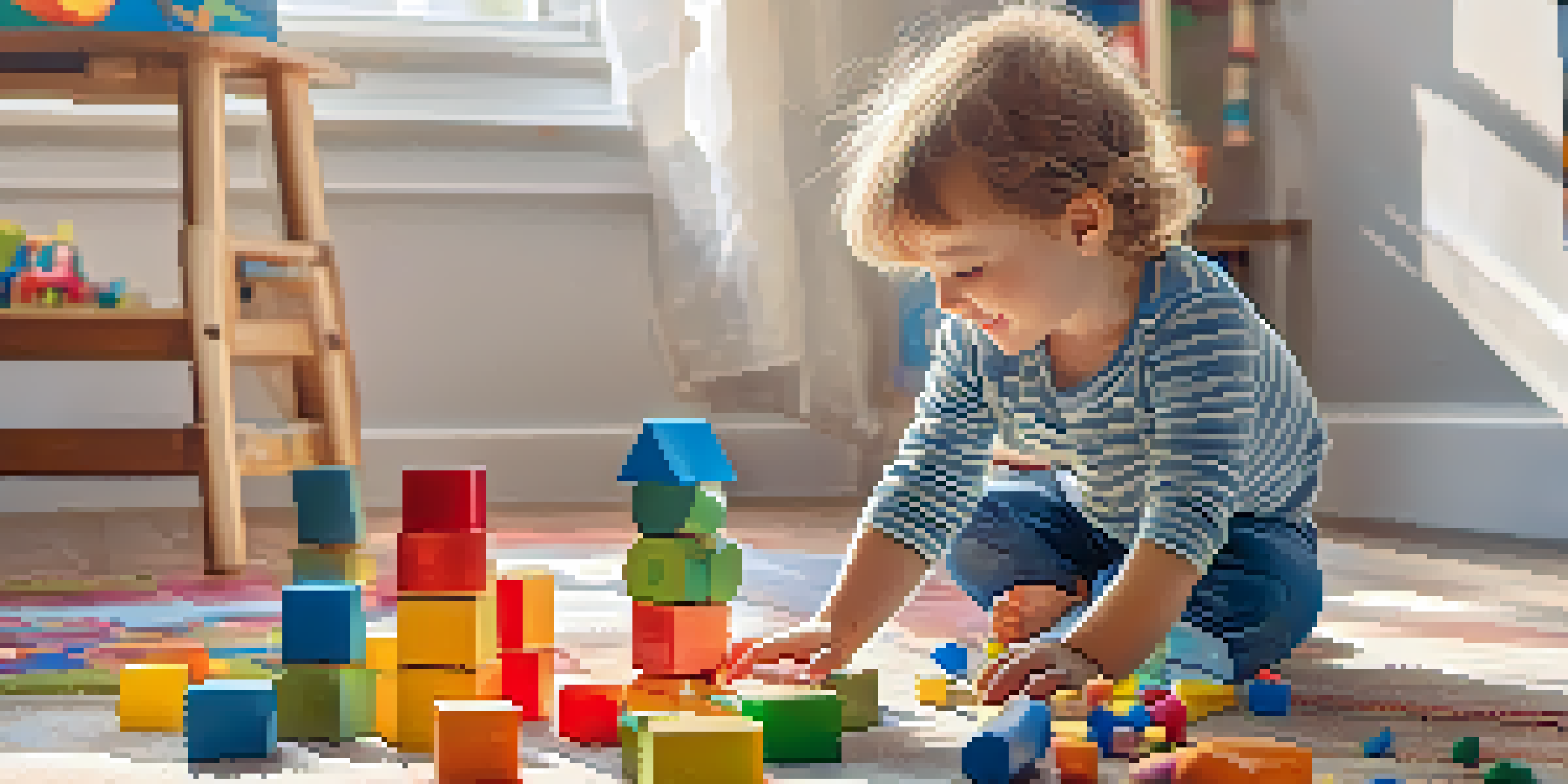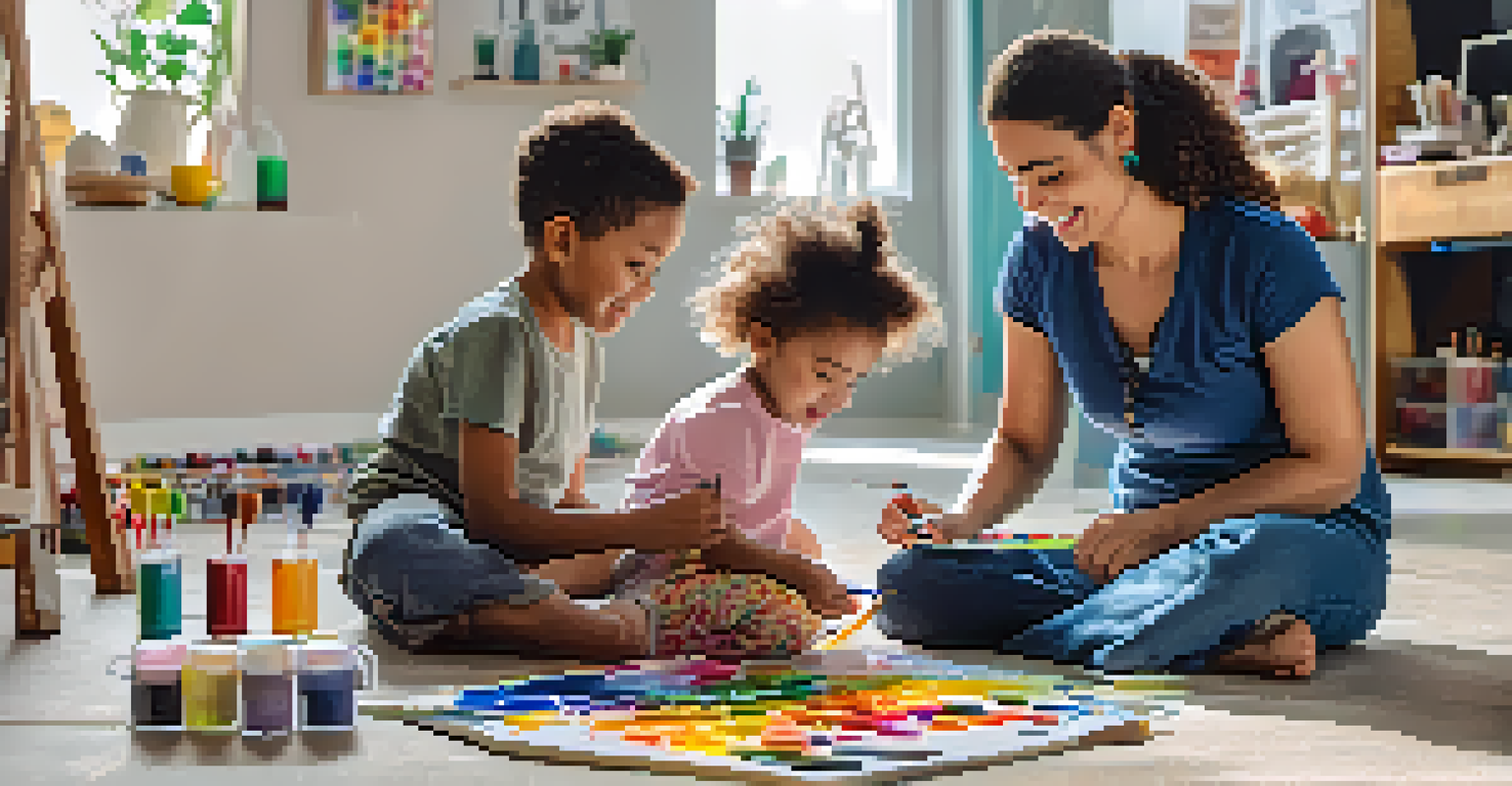Importance of Play in Early Childhood Development and Learning

Understanding the Concept of Play in Childhood
Play is often seen as mere fun, but it’s so much more than that. It’s a vital activity that fosters creativity and exploration in young minds. Through play, children engage with the world around them, discovering new concepts and ideas. This active engagement lays the groundwork for future learning and development.
Play is the highest form of research.
Imagine a child playing with building blocks; they are not just stacking blocks—they are experimenting with balance, gravity, and spatial relationships. This hands-on experience is foundational for understanding complex concepts later in life. Play encourages children to ask questions and seek answers, inherently driving their curiosity.
Moreover, play isn’t just about individual learning; it also helps develop social skills. When children play together, they learn to communicate, negotiate, and empathize with one another. These social interactions are crucial for emotional development and help build the foundation for healthy relationships.
The Benefits of Play for Cognitive Development
Cognitive development refers to the growth of a child's ability to think and reason. Play is a key player in this area, as it stimulates brain development through imaginative scenarios and problem-solving activities. When children engage in pretend play, for instance, they are not only having fun but also developing critical thinking skills.

Consider a child pretending to be a doctor. This role-play scenario encourages them to think critically about health, empathy, and responsibility. Such imaginative play can foster cognitive flexibility, which is essential when faced with real-life challenges. The best part? They’re learning while they think they’re just having fun!
Play Fuels Cognitive Growth
Engaging in play stimulates children's brain development, enhancing critical thinking and problem-solving skills.
Additionally, different types of play, like puzzles or games, can enhance memory and concentration. These activities challenge children to focus and strategize, further boosting their cognitive abilities. In essence, play serves as a powerful tool for developing a child’s intellect in a natural and enjoyable way.
Play as a Catalyst for Emotional Growth
Emotional development is another crucial aspect of early childhood, and play acts as a catalyst for this growth. Through play, children can express their feelings and process experiences in a safe environment. For example, when a child plays out a scenario involving conflict, they learn to navigate their emotions and understand others’ feelings.
Children learn as they play. Most importantly, in play, children learn how to learn.
Imagine a child playing with dolls and acting out a story where one doll feels sad. This play allows them to explore empathy, compassion, and problem-solving. Such experiences help children recognize their emotions and those of others, which is vital for emotional intelligence.
Furthermore, engaging in play can help reduce anxiety and build resilience. As children face challenges in play—like losing a game or figuring out a tricky puzzle—they learn to cope with disappointment and develop perseverance. This emotional strength will serve them well throughout their lives.
Developing Social Skills Through Play
Social skills are not just learned in a classroom; they are often cultivated during play. When children engage with peers in games and activities, they practice essential skills like cooperation, sharing, and communication. These interactions help them learn the art of negotiation and conflict resolution.
For instance, when children take turns in a game, they learn patience and respect for others. They also begin to understand the importance of teamwork and collaboration. These experiences are invaluable, as they prepare children for future social interactions in school and beyond.
Play Enhances Emotional Skills
Through play, children learn to navigate emotions, build empathy, and develop resilience in a safe environment.
Additionally, play often involves a degree of competition, which teaches children how to handle winning and losing gracefully. This balance of social play fosters a sense of community and belonging, making it a fundamental part of their overall development.
The Role of Adults in Facilitating Play
While play is primarily a child-led activity, the role of adults in facilitating play is crucial. Parents and caregivers can create an environment that encourages exploration and imagination. By providing a variety of materials and opportunities for play, adults can inspire creativity and curiosity in children.
For example, setting up a play area with art supplies, building blocks, or nature materials invites children to explore their interests. Adults can also join in the play, guiding children through new experiences while allowing them to lead the way. This involvement not only enhances learning but also strengthens the bond between adult and child.
Moreover, adults can help children reflect on their play experiences. Asking open-ended questions about what they are doing or how they feel encourages deeper thinking and self-awareness. This reflection is essential for connecting play to learning, making the experience even richer.
The Impact of Structured vs. Unstructured Play
Play can be categorized into structured and unstructured types, each offering unique benefits. Structured play, like organized sports or educational games, provides guided experiences that can hone specific skills. These activities often come with rules and objectives, which can enhance focus and discipline.
On the other hand, unstructured play allows for free exploration and creativity. This type of play is where imagination flourishes, as children create their own games and rules. Unstructured play promotes independence and decision-making, essential skills for lifelong learning.
Social Skills Blossom in Play
Interactive play helps children cultivate essential social skills like communication, cooperation, and conflict resolution.
Balancing both types of play is crucial for well-rounded development. While structured play offers skill-building opportunities, unstructured play fosters creativity and problem-solving. Together, they create a rich tapestry of experiences that contribute to a child's growth.
Encouraging Play in a Digital Age
In today’s digital age, screen time often competes with traditional play. While technology can offer educational benefits, it's essential not to overlook the importance of physical play and face-to-face interactions. Balancing screen time with active play is vital for healthy development.
Encouraging outdoor play, arts and crafts, and interactive games can help children disconnect from screens and reconnect with their surroundings. Organizing playdates or community events can also promote social interactions that are vital for their growth. The key is to create opportunities for children to engage in diverse types of play.

Parents and educators can lead by example, demonstrating the value of play in their own lives. When adults prioritize play, children are more likely to understand its importance. By fostering a culture that celebrates play, we can help children thrive in every aspect of their development.